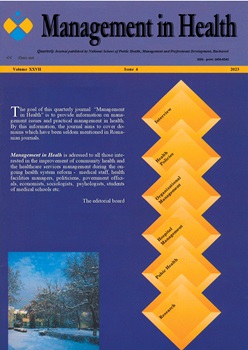Abstract
The Geriatrics, the medicine of the elderly, delivers measurable results
that optimize health and delay degenerative aging, using the precision
medicine, the innovative technologies, the personalized treatments and the
solid science.
The quality of life of the elderly is one of the priorities of social policies
worldwide, as it affects not only individuals but also the whole of society,
given longevity which is a remarkable collective achievement, supported by
significant progress in economic and social development and health, which
have greatly improved the quality of life and contributed to a 10-year increase
in average life expectancy over the past 50 years [1].
The training of all medical personnel, regardless of specialty, but
especially of the physician, respectively the general practitioner, with
knowledge related to the medical assistance of the elderly is required. If it is
taken into account that geriatric care involves not only consultations, but
especially care, usually complex, it is understood that the role of the physician
and other medical personnel (nurses, carers) becomes very important, and the
quality of life of the elderly is one of the priorities of social policies, all over the
world, as it affects not only individuals, but also the whole society.

